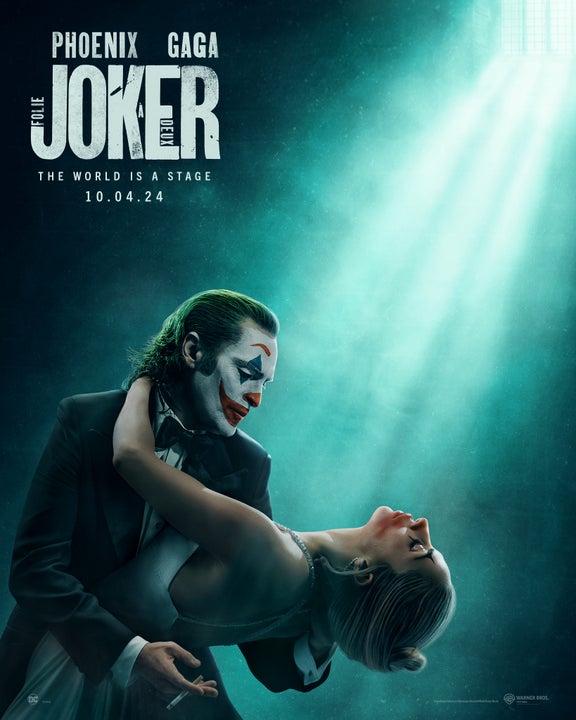Joker: Folie à Deux
Joker: Folie à Deux, 2024, 3 ¼ stars
Sing me deadly
Joker returns with a song in his heart
 Exclusive to MeierMovies, October 4, 2024
Exclusive to MeierMovies, October 4, 2024
“Knock, knock.
Who’s there?
Arthur Fleck.
Arthur Fleck who?”
Indeed, the world had never heard of Arthur Fleck until he found a super(anti)hero inside himself in director Todd Phillips’ original Joker, from 2019. He was the epitome of Thoreau’s “quiet desperation,” with a side of mental illness. Then came his murder spree, which culminated in the on-air massacre of television talk-show host Murray Franklin. Now, in the unlikely sequel, Arthur finds himself incarcerated at Gotham’s Arkham Asylum, awaiting trial.
Clinging to his last bit of sanity, he finds a seemingly kindred spirit, Harleen “Lee” Quinzel (Harley Quinn), who has been committed to the asylum’s minimum-security wing by her own mother, after she set fire to her family’s apartment building. For Arthur and Lee, it is love at first joke. Together, they embrace their affinity for song and fantasize about a life together outside the asylum while staging Chicago-like musical numbers in their own minds.
The original film was a cross between a drama, a psychological thriller and a comic-book-origin story, but the sequel audaciously combines even more genres, including romance, dark comedy, musical and even animation, in the form of a clever opening cartoon that makes Itchy and Scratchy look like Mickey Mouse. Above all else, it’s daringly dark and startlingly strange.
An eclectic and original vision from Phillips, who again co-wrote the script with Scott Silver (based, of course, on DC Comics characters), the film both embraces and transcends its weirdness. It doesn’t always work and flirts with tedium, especially in its musical interludes, which feature established tunes such as “If My Friends Could See Me Now,” “Get Happy” and “For Once in My Life.” And the story is weaker than the original’s. In fact, the main reason it succeeds is simply because it exists in the shadow of the original, which is one of the three best comic-book films of all time (without really being a comic-book film). But the sequel’s own oddness is mesmerizing, mostly thanks to another completely unhinged performance from Joaquin Phoenix in the title role. Lending nice support is Lady Gaga as Lee (who is, thankfully, a much better singer than Phoenix), Brendan Gleeson as an asylum guard, Catherine Keener as Arthur’s lawyer, Harry Lawtey as prosecuting attorney Harvey Dent, Steve Coogan as a TV interviewer and Leigh Gill as Arthur’s former friend.
The latter steals the courtroom scenes when he painfully recounts witnessing Arthur’s brutal slaying of their mutual friend. It’s the movie’s most honest moment and a reminder that a single act of violence can mean a lifetime of psychological trauma.
The movie’s weirdness isn’t for everyone. Take the preview audience I had the misfortune of sitting with. (Take them, please.) They never shut up except when shoving popcorn in their fat faces. And they groaned aloud when each new song began, apparently unaware in advance that Joker: Folie à Deux is part-musical. And they made fun of things they couldn’t comprehend. It makes one understand, if not forgive, Arthur’s desire to blow up the whole sick world in which he lives.
Most glaringly, the audience didn’t seem to understand the movie’s surprises, and the biggest one – spoiler alert – is that Arthur ultimately rejects Joker and claims some responsibility and guilt for his brutality. His joke finally comes to an end, at least in his own mind, and he exhibits a degree of humanity – or at least as much humanity as that aforementioned audience.
Befitting the darkness in the movie – and this review – perhaps Phillips should have subtitled his film not Folie à Deux (madness for two) but Folie à Tout (madness for all).
© 2024 MeierMovies, LLC
For more information about this movie, visit IMDB and Wikipedia. It is currently screening in cinemas. And to read my review of the original Joker, go here.